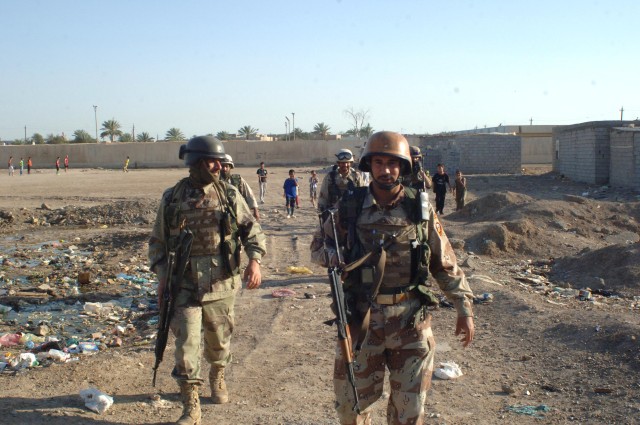WASHINGTON (American Forces Press Service, May 15, 2007) - Restricting the northward passage of weapons and other enablers of violence from southern Iraq into Baghdad is crucial to stabilizing the Iraqi capital, a U.S. general said May 10.
The flow of "accelerants" into the city works to prolong Baghdad's instability by replenishing stockpiles of the competing sectarian factions there, said Brig. Gen. Edward Cardon, deputy commander of the 3rd Infantry Division.
During a conference call with online journalists and military "bloggers," Brig. Gen. Cardon said his Soldiers are tasked with reducing that flow. He defined an accelerant as "a physical component that facilitates violence and perpetuates further instability."
Now in its third deployment to Iraq in four years, the 3rd Infantry Division is in control of Multinational Division Central, a newly created sub-command of Multinational Force Iraq tasked with securing Babil, Najaf and Karbala provinces, as well as parts of Baghdad province.
Through their work to keep such accelerants out of Baghdad, Brig. Gen. Cardon said, his Soldiers provide U.S.-Iraqi plus-up forces an opportunity to "lock down the security situation" in the capital.
Outside Baghdad, Brig. Gen. Cardon said, there are pockets of reduced sectarian violence, despite a constant threat from extremists on both sides of the Sunni-Shiite divide. He named al Qaeda and Jaysh al-Mahdi as organizations of particular concern.
The U.S. presence has helped mitigate that threat, however, Brig. Gen. Cardon said, and there has been a noticeable reduction in murders and bomb attacks in his area of responsibility even since January. "Is it perfect'" he said. "No. But we're not seeing the sectarian violence that used to be there."
With troops spread across 26 joint security stations and related posts, Brig. Gen. Cardon said the gains in stability have not come without cost. He noted that since April 1, his division has lost 14 servicemembers, with an additional 39 wounded. Most casualties resulted from IEDs.
Brig. Gen. Cardon implicated Iran in supporting the violence against U.S. troops. "There's clear evidence that some of these extremists receive their support, financing and training outside of Iraq," he said.
The general pointed to "date stamps and Iranian markings" on ammunition captured during recent weapons cache discoveries as evidence of outside interference.
While 3rd Infantry Division Soldiers continue to capture weapons caches throughout the region, Brig. Gen. Cardon said, the Iranian markings are particularly problematic because "it means (enemy fighters are) getting re-supplied."
Iranian involvement would synch with Shiite militias' desire to carve a clear supply route and area of influence from their stronghold in southern Iraq up into Baghdad, Brig. Gen. Cardon explained.
"There's no doubt that (Jaysh al-Mahdi) is trying to open what we call the 'central corridor,' straight down out of Baghdad, down to Karbala and Najaf," he said.
However, Brig. Gen. Cardon said he draws hope for the area from encouraging signs in the political realm, as well as substantial progress within the Iraqi security forces over his previous rotations in Iraq.
"Political development's going in a positive direction," he said. "I think the local governments are becoming a lot stronger, have greater legitimacy, even though we still haven't had our provincial elections."
Providing some breathing room for stronger government leadership "was the whole intent of the surge," he explained.
Brig. Gen. Cardon said he views assisting fledgling local and provincial governments as his division's potentially most fruitful role in the area. He pointed to U.S.-led provincial reconstruction teams as the agents of that assistance.
"We're not going to be able to eliminate violence on our own with a simple military approach, so we're working really on training the Iraqi security forces and building the capacity of the Iraqi government," he said.
Considering the "very Baghdad-centric" view of the national government, Brig. Gen. Cardon explained the need to use the teams to facilitate a relationship between the national and provincial Iraqi governments on areas like infrastructure development and budget.
"One of our goals is to continue to work to connect local governments to provincial governments, provincial governments to national government," he said.
Brig. Gen. Cardon repeatedly stressed his respect for the provincial reconstruction team (PRT) mission, pledging to devote whatever resources are necessary to assist the work of these teams.
"I'm working hard to make sure they're properly resourced, from the embassy and from Multinational Force Iraq," he said.
At the same time, the general noted, he is looking to build the Iraqis' capabilities by supporting indigenous initiatives, rather than using the PRTs to force American standards and mechanisms on them.
"Iraq has to lead Iraq," Brig. Gen. Cardon said. "Under Saddam Hussein, there were a lot of systems that did work, and we should not try and create American systems that have evolved over decades and then impose it on them."
Brig. Gen. Cardon pointed to an early U.S. effort to replace Iraq's paper-driven stock exchange with an electronic version as an example of the misplaced efforts he's now hoping to avoid. "We're trying to focus on what we can actually deliver," he said.
Coming from that angle, Brig. Gen. Cardon predicted areas of success in the region owing to the enhanced U.S. commitment there.
Multinational Division Central used to be an "economy of force" area, he explained, meaning it was strategically a lower priority than Baghdad. "Now this is our sole focus," he said of the division's mission.
The military can always clear an area, Brig. Gen. Cardon said, "but our ability to hold it and then build something there has always been the problem, and I think this time we have at least some of the capacity to be able to do that."


Social Sharing